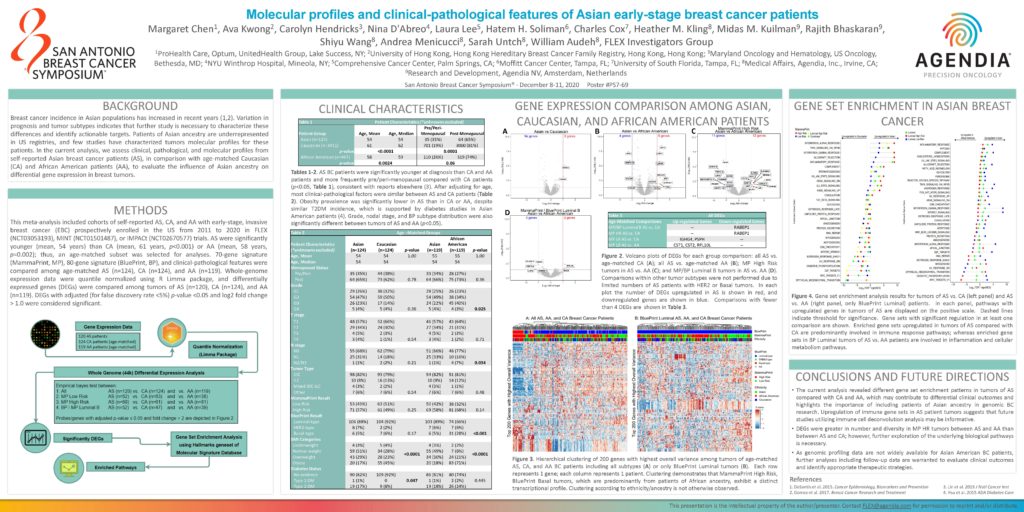PUBLICATION:
SABCS 2020
AUTHORS:
Margaret Chen, Ava Kwong, Carolyn Hendricks, Nina D’Abreo, Laura Lee, Hatem H. Soliman, Charles Cox, Heather M. Kling, Midas M. Kuilman, Rajith Bhaskaran,
Shiyu Wang, Andrea Menicucci, Sarah Untch, William Audeh, FLEX Investigators Group
Background:
Breast cancer incidence in Asian populations has increased in recent years (1,2). Variation in prognosis and tumor subtypes indicates that further study is necessary to characterize these differences and identify actionable targets. Patients of Asian ancestry are underrepresented in US registries, and few studies have characterized tumors molecular profiles for these patients. In the current analysis, we assess clinical, pathological, and molecular profiles from self-reported Asian breast cancer patients (AS), in comparison with age-matched Caucasian (CA) and African American patients (AA), to evaluate the influence of Asian ancestry on differential gene expression in breast tumors.
Methods
This meta-analysis included cohorts of self-reported AS, CA, and AA with early-stage, invasive breast cancer (EBC) prospectively enrolled in the US from 2011 to 2020 in FLEX (NCT03053193), MINT (NCT01501487), or IMPACt (NCT02670577) trials. AS were significantly younger (mean, 54 years) than CA (mean, 61 years, p<0.001) or AA (mean, 58 years, p=0.002); thus, an age-matched subset was selected for analyses. 70-gene signature (MammaPrint, MP), 80-gene signature (BluePrint, BP), and clinical-pathological features were compared among age-matched AS (n=124), CA (n=124), and AA (n=119). Whole-genome expression data were quantile normalized using R Limma package, and differentially expressed genes (DEGs) were compared among tumors of AS (n=120), CA (n=124), and AA (n=119). DEGs with adjusted (for false discovery rate <5%) p-value <0.05 and log2 fold change > 1.0 were considered significant.
Conclusions and Future Directions
- The current analysis revealed different gene set enrichment patterns in tumors of AS compared with CA and AA, which may contribute to differential clinical outcomes and highlights the importance of including patients of Asian ancestry in genomic BC research. Upregulation of immune gene sets in AS patient tumors suggests that future studies utilizing immune cell deconvolution analysis may be informative.
- DEGs were greater in number and diversity in MP HR tumors between AS and AA than between AS and CA; however, further exploration of the underlying biological pathways is necessary.
- As genomic profiling data are not widely available for Asian American BC patients, further analyses including follow-up data are warranted to evaluate clinical outcomes and identify appropriate therapeutic strategies.



